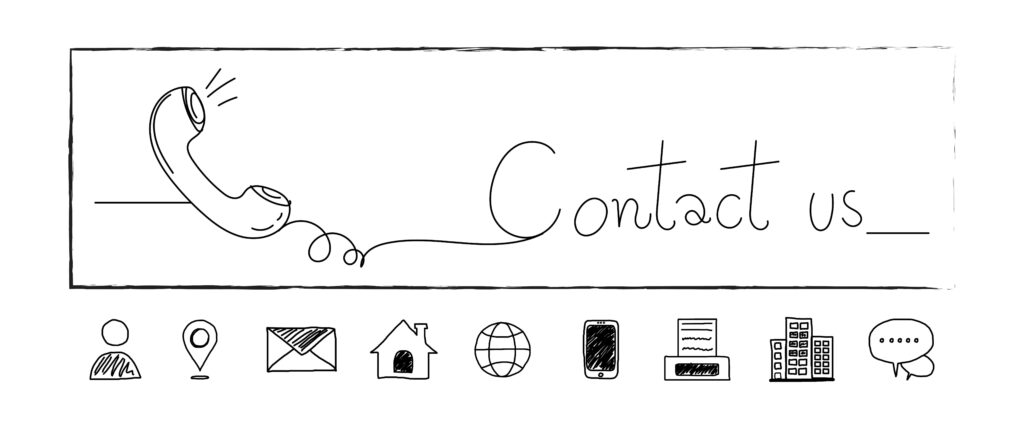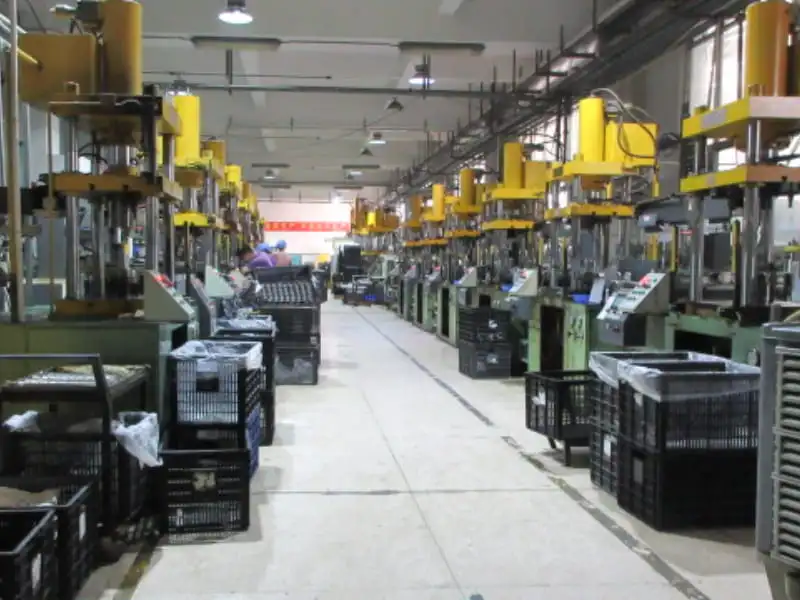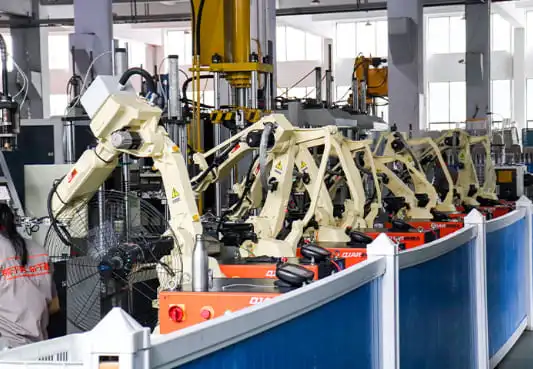If you're in the stainless steel water bottle manufacturing industry, you know that your success depends on more than just the quality of your product. A strong supplier network is critical to ensure that you have reliable access to the materials and services needed to produce top-quality bottles.
Beyond just securing supplies, building strong relationships with suppliers can also provide numerous benefits, including improved communication, better pricing, and increased flexibility.
To build a strong supplier network, it's important to identify the right suppliers who can meet your specific needs and establish clear communication channels from the outset. Building trust and respect through collaboration is also key to nurturing these relationships over time.
By leveraging technology and engaging in continuous improvement efforts while maintaining ethical standards for all parties involved, you can foster long-term partnerships that benefit both your business and your suppliers.
In this article, we'll explore some practical strategies for building a robust supplier network in stainless steel water bottle manufacturing.
Importance of a Strong Supplier Network in Stainless Steel Water Bottle Manufacturing
You can't afford to ignore the importance of having a strong supplier network if you want to succeed in stainless steel water bottle manufacturing. The quality of your product relies heavily on the quality of the raw materials supplied by your suppliers. Thus, careful supplier selection is crucial in ensuring that your products meet customers' expectations and regulatory requirements.
Apart from quality, supply chain optimization is another factor that highlights the significance of a strong supplier network. Efficient supply chain processes result in lower costs, faster delivery times, and improved customer satisfaction levels. A well-established network helps streamline procurement activities, reduce lead time, and minimize inventory carrying costs.
Overall, building a strong supplier network requires strategic planning and execution. Careful consideration should be given not only to price but also to factors such as reliability, responsiveness, flexibility, and sustainability.
By doing so, you can ensure that your business has access to high-quality raw materials while maintaining efficiency and profitability in its operations.
Identifying the Right Suppliers

When identifying the right suppliers for your stainless steel water bottle manufacturing, there are several key factors to consider.
First and foremost is quality - you want to make sure that the materials used in your bottles are of the highest standard to ensure customer satisfaction.
Next, price is important as it affects your profit margins, but don't sacrifice quality for a lower cost.
Delivery times and reliability are also crucial, as delays or inconsistent supply can negatively impact production timelines and ultimately affect your bottom line.
By carefully evaluating potential suppliers based on these criteria, you can build a strong network that will support your business success.
Quality
To ensure top-notch products, it's crucial to prioritize quality control throughout the entire stainless steel water bottle manufacturing process. Improving processes and ensuring consistency in product quality are key components of building a strong supplier network and fostering positive supplier relationship management.
One way to improve processes is by implementing a comprehensive quality control system that covers every stage of production, from raw materials sourcing to finished product inspection. This can involve setting strict standards for material selection and testing, monitoring production lines for efficiency and accuracy, and conducting regular audits to identify areas for improvement.
By doing so, you can reduce the risk of defects or inconsistencies in your products, which will not only enhance customer satisfaction but also strengthen relationships with suppliers who value reliability and consistency.
Price
The price of a stainless steel water bottle can vary depending on factors such as size, design, and brand. Negotiating tactics play a crucial role in determining the final price you pay your supplier. Here are some strategies to help you negotiate better prices for your stainless steel water bottles:
- Conduct thorough cost analysis before negotiating: It's important to understand the costs involved in producing the water bottles so that you can negotiate from an informed position. This could include analyzing raw material costs, labor costs, production overheads, and shipping costs.
- Use multiple quotes to your advantage: Get quotes from multiple suppliers and use them to negotiate a better deal with your preferred supplier. This will give you leverage during negotiations and ensure that you get the best possible price.
- Don't focus solely on price: While it's essential to get a good deal, don't forget about other factors such as quality, reliability, and delivery times. Consider all these factors when negotiating with suppliers.
By using these negotiating tactics and conducting cost analysis beforehand, you'll be able to secure better deals with your suppliers while maintaining high-quality standards for your stainless steel water bottles.
Delivery Times
Ensuring timely delivery of your order is crucial for maintaining customer satisfaction and meeting demand. It's important to build a strong supplier network that can deliver products quickly and reliably.
To achieve this, you need to work closely with your suppliers to improve efficiency and optimize logistics. One way to improve efficiency is by using technology. You can implement an electronic ordering system that allows you to track orders in real-time, ensuring that each step of the process is completed on time. Additionally, you can also use software to manage inventory levels so that you always have enough stock on hand without overstocking or running out of materials.
Another strategy for optimizing logistics is by working with suppliers who are located near your manufacturing facilities. This reduces shipping times and costs while also minimizing the risk of delays due to transportation issues. By building strong relationships with these suppliers, you'll be able to negotiate better terms and ensure that they prioritize your orders when fulfilling requests from other customers.
Overall, improving delivery times requires a collaborative effort between manufacturers and their supply chain partners, but the benefits in terms of customer satisfaction and operational efficiency are well worth it.
Reliability
Now that you've learned about delivery times, it's important to understand the next crucial aspect of building a strong supplier network: reliability. Reliability is the backbone of your relationship with suppliers and can make or break your business.
To ensure you're establishing a reliable supplier network, here are some key metrics to keep in mind:
- On-time delivery rate - This metric measures how often suppliers deliver on time as promised. A high percentage indicates that they're dependable and can be trusted to meet deadlines.
- Quality control - Suppliers must consistently provide high-quality materials and products that meet your standards. If there are issues with quality control, it can negatively impact your production process.
- Communication - Open communication is essential for building trust and ensuring reliability between you and your suppliers.
- Responsiveness - Suppliers should be responsive to any issues or concerns that arise quickly, allowing for swift resolution.
By prioritizing these metrics when evaluating potential suppliers, you can build a reliable network that will enable smooth operations and long-term success for your stainless steel water bottle manufacturing business.
Remember, building trust is key in any successful partnership, so choose wisely!
Establishing Clear Communication Channels

To effectively manage supplier relationships in stainless steel water bottle manufacturing, it's crucial to establish clear communication channels. Effective communication is the backbone of any successful business partnership, and this applies to supplier relationship management as well.
By communicating with your suppliers regularly and clearly, you can ensure that they understand your expectations and requirements. One way to establish clear communication channels is by setting up regular meetings with your suppliers. These meetings can be face-to-face or virtual, depending on what works best for both parties.
During these meetings, you should discuss supplier expectations and performance metrics, as well as any issues or concerns that arise. It's important to listen actively during these conversations so that you can build a strong rapport with your suppliers.
In addition to regular meetings, consider using technology tools like email, instant messaging, and video conferencing to maintain open lines of communication with your suppliers. This will help ensure that everyone is on the same page when it comes to orders, shipments, and other important details.
By establishing clear communication channels with your suppliers, you can foster stronger relationships that will benefit both parties in the long run.
Building Trust and Respect

If you want to establish a successful partnership, you need to earn the trust and respect of your suppliers. Without these two crucial elements, it'll be difficult to foster a strong supplier relationship management in stainless steel water bottle manufacturing.
To build trust and respect, you must develop effective communication techniques that'll help you connect with your suppliers on a deeper level. Trust building strategies are essential when trying to establish long-term relationships with your suppliers.
One way of doing this is by being transparent about your business operations and how they affect them. Another strategy is by meeting their expectations consistently and delivering on promises made. Honesty is also key in developing trust between businesses, so always ensure that you're truthful in all your dealings.
Effective communication techniques can help break down any barriers that may exist between you and your suppliers. Regular meetings, phone calls, or emails can help keep everyone informed about any changes or updates in the production process. Additionally, showing interest in their work and offering support whenever necessary can go a long way towards building mutual respect.
Remember that supplier relationship management takes time and effort, but building lasting partnerships will ultimately lead to increased productivity and profitability for both parties involved.
Collaborating with Suppliers

Collaborating closely with your suppliers is like working hand in hand towards a common goal of producing high-quality stainless steel water bottles. You need to establish effective supplier communication to ensure that you're both on the same page and have a good understanding of each other's needs. By doing so, it becomes easier to identify potential issues early on and work together to find solutions before they become major problems.
Supplier collaboration benefits include increased efficiency, reduced costs, improved quality, and innovation. When you collaborate with your suppliers, you can tap into their expertise and experience in materials sourcing, production processes, and product design. This will help you create better products that meet the needs of your customers while also reducing waste and increasing productivity.
To foster effective supplier collaboration, it's essential to establish clear lines of communication from the outset. Share information about your business goals and objectives with your suppliers so that they understand what you're trying to achieve. Encourage open dialogue between yourself and your suppliers by scheduling regular meetings or check-ins to discuss progress updates or issues as they arise.
By building strong relationships with your suppliers based on trust, mutual respect, and clear communication channels, you'll be able to produce high-quality stainless steel water bottles efficiently while keeping costs low.
Regular Performance Evaluation
Regularly evaluating performance is crucial for ensuring the success of your partnership with suppliers. By monitoring their performance, you can identify areas where they're excelling and those that need improvement. Performance metrics such as on-time delivery, quality, and cost can be used to track their progress. It's important to provide feedback on both positive and negative aspects of their performance.
Once you've identified areas for improvement, work with your suppliers to develop improvement plans. These plans should outline specific actions that'll be taken to address any issues or shortcomings in their performance. This collaborative approach will help build trust and strengthen your relationship with them. It's also essential to set realistic goals and timelines for implementing these improvement plans.
Regular communication is key when it comes to evaluating supplier performance. Schedule regular meetings with your suppliers to discuss their progress towards meeting the agreed-upon metrics and goals outlined in the improvement plan. This'll allow you to make adjustments as needed and ensure that everyone's on the same page.
By regularly evaluating supplier performance, developing improvement plans, and fostering open communication channels, you can build a strong network of reliable suppliers who're invested in the success of your business.
Managing Risks and Contingencies
To effectively manage risks and contingencies in stainless steel water bottle manufacturing, you'll need to have a solid plan in place beforehand. Start by identifying potential risks such as supply chain disruptions, quality control issues, and unexpected changes in demand. Once you've identified these risks, develop a risk mitigation strategy that outlines steps to minimize or eliminate them.
Contingency planning is also crucial in managing supplier relationships. It involves creating backup plans for any potential problems that may arise. For example, if one of your suppliers unexpectedly goes out of business or experiences production delays, you should have alternate suppliers ready to step in and fill the gap.
The goal of contingency planning is to minimize disruption to your supply chain and ensure continued production.
Regularly reviewing and updating your risk mitigation and contingency plans is essential as new risks can emerge at any time. Stay informed about industry trends and keep an open line of communication with your suppliers so that you can quickly adapt to any changes.
By proactively managing risks and developing strong contingency plans, you'll be better prepared to handle unexpected situations while maintaining a strong supplier network for your stainless steel water bottle manufacturing business.
Contract Negotiation and Management

When negotiating and managing contracts, you'll need to stay on top of deadlines and deliverables to ensure a successful partnership. Start by selecting the right supplier for your business needs. Look for suppliers who can provide quality materials at competitive prices, have a good track record in the industry, and are willing to work with you to meet your specific requirements.
Once you've selected a supplier, it's important to negotiate contract terms that protect both parties' interests. Be clear about pricing, delivery schedules, warranties, and any other key terms that will impact your relationship. Set expectations early on so that there aren't any surprises down the line.
Don't forget about risk mitigation and contingency planning when managing contracts with suppliers. Identify potential risks and develop plans to minimize their impact on your business operations. Be prepared for unforeseen events such as shipping delays or quality issues by having backup suppliers or alternative solutions in place.
With careful negotiation and management of contracts, you can build strong relationships with suppliers that'll benefit your business over the long term.
Supplier Diversity and Sustainability
As a stainless steel water bottle manufacturer, you need to be mindful of promoting diversity and ensuring sustainability within your supplier network.
By actively seeking out diverse suppliers, you can build a stronger and more inclusive supply chain that reflects the values of your company.
Additionally, implementing sustainable practices with your suppliers can reduce environmental impact and improve long-term business performance.
Taking these steps will not only benefit your bottom line, but also contribute positively to society as a whole.
Promoting Diversity
By actively seeking out and partnering with a diverse range of suppliers, you can not only promote inclusivity in your supply chain but also benefit from a wider pool of expertise and innovation. Inclusion initiatives and supplier diversity programs are key to achieving this goal. These efforts can help you build strong relationships with suppliers who share your values and commitment to sustainability.
Here are three ways to promote diversity in your supplier network:
- Attend industry events focused on supplier diversity.
- Seek out small businesses owned by women, minorities, veterans, or other underrepresented groups.
- Partner with organizations that support supplier diversity, such as the National Minority Supplier Development Council or Women's Business Enterprise National Council.
By taking these steps, you can create a more inclusive supply chain that reflects the diverse perspectives and experiences of your customers. This will not only improve your bottom line but also help build a more equitable society for all.
Ensuring Sustainability
To ensure the sustainability of your supply chain, you need to carefully evaluate each step of the production process and prioritize eco-friendly practices that reduce waste and minimize your carbon footprint.
This includes using sustainable materials in the manufacturing of stainless steel water bottles. When selecting suppliers, consider those who source their raw materials from environmentally responsible sources.
Look for suppliers who have implemented eco-friendly practices in their own operations, such as using renewable energy sources or implementing recycling programs. You can also work with your suppliers to develop more sustainable packaging solutions that reduce waste and use biodegradable or recyclable materials.
By prioritizing sustainability throughout your supply chain, you not only minimize negative impacts on the environment but also build a positive reputation for your brand among consumers who are increasingly conscious of environmental issues.
Supplier Training and Development
As a manufacturer in the stainless steel water bottle industry, you know that your suppliers play a critical role in the success of your business.
To ensure that your suppliers are equipped to meet your needs and exceed expectations, it's essential to provide them with training and development opportunities.
By focusing on skills enhancement, capacity building, and knowledge sharing, you can foster strong supplier relationships.
These relationships will benefit both parties for years to come.
Skills Enhancement
Improving your skills is crucial for building a strong supplier network and fostering successful supplier relationship management in stainless steel water bottle manufacturing. As you work towards enhancing your capabilities, consider the following steps:
- Identify areas for improvement: Take time to reflect on your current skill set and identify areas that need improvement. This could include soft skills such as communication, negotiation, and conflict resolution or technical skills such as data analysis or quality control.
- Develop a plan: Once you've identified areas for improvement, develop a plan to enhance these skills. This could involve enrolling in training programs, seeking mentorship from experienced professionals, or practicing these skills in real-life scenarios.
By focusing on skill enhancement, you can build stronger relationships with your suppliers and improve the overall efficiency of your supply chain. Remember that investing in yourself is an investment in the success of your business.
In addition to improving your own skills, it's important to encourage growth within your supplier network as well. Consider implementing training programs for suppliers to help them develop their own capabilities and better meet the needs of your business. By working together to enhance each other's skills, you can create a more collaborative and mutually beneficial partnership with your suppliers.
Capacity Building
Now that you've enhanced your skills in supplier relationship management, it's time to focus on capacity building. This means developing the capabilities of your suppliers and ensuring they have the necessary resources to meet your demands.
One important aspect of capacity building is supplier evaluation, which involves assessing a supplier's strengths and weaknesses, as well as their potential for growth and improvement. To effectively evaluate your suppliers, you need to establish performance metrics that align with your business goals.
These metrics can include on-time delivery rates, product quality standards, cost competitiveness, and responsiveness to customer needs. By tracking these metrics over time and providing feedback to your suppliers, you can help them improve their performance and build stronger relationships based on mutual trust and respect.
Additionally, providing training or other resources to support their development can help build their capacity over the long-term. Ultimately, by investing in capacity building for your suppliers, you can create a more resilient supply chain that delivers high-quality products at a competitive price point.
Knowledge Sharing
Sharing knowledge with your suppliers can help them better understand your business goals and improve their performance over time. Effective communication strategies are essential to ensure that the knowledge sharing process is successful.
By providing information about your company's vision, market trends, and product specifications, you can help your suppliers create products that meet your needs and exceed customer expectations. Knowledge sharing benefits both parties involved in the supplier relationship management process.
Suppliers gain insight into your business operations, which allows them to identify areas where they can innovate and improve their services. At the same time, you benefit from suppliers who are better equipped to anticipate changes in market demand or product requirements.
In addition, effective knowledge sharing helps build trust between you and your suppliers by demonstrating a commitment to collaboration and mutual success.
Using Technology to Enhance Supplier Relationships

By utilizing technology, you can easily strengthen your supplier relationships and enhance communication in the stainless steel water bottle manufacturing process. Maximizing efficiency and streamlining processes are critical components of a successful supplier relationship management strategy.
By implementing tools such as procurement software, supply chain management software, and customer relationship management (CRM) systems, you can automate key processes and reduce the time spent on administrative tasks. Data analytics and performance metrics are also essential for enhancing supplier relationships.
With access to real-time data, you can monitor supplier performance, identify areas for improvement, and make informed decisions based on objective data. Assembling a dashboard that provides visibility into key metrics such as lead times, delivery accuracy rates, and quality scores can help you stay on top of your suppliers' performance.
This information is crucial when it comes to selecting suppliers for future projects or renegotiating contracts with existing ones. Ultimately, technology can be a powerful tool in building strong supplier relationships in stainless steel water bottle manufacturing.
By maximizing efficiency through automation and leveraging data analytics to inform decision-making, you can foster trust with your suppliers while simultaneously driving down costs and increasing productivity. Investing in these technologies is an investment in your long-term success as a manufacturer - both now and into the future.
Engaging in Continuous Improvement
To continuously improve your stainless steel water bottle manufacturing process, you need to actively seek feedback and suggestions from your suppliers and customers.
Process optimization is also crucial in order to streamline your operations and reduce costs while maintaining quality.
Additionally, innovation is key in staying ahead of the competition and meeting evolving market demands.
By focusing on these areas, you can achieve a more efficient and effective supply chain for your business.
Feedback and Suggestions
You should actively seek out feedback and suggestions from your suppliers to improve your stainless steel water bottle manufacturing process. Communication's key in any business relationship, and you need to establish an open line of communication with your suppliers. This'll allow you to address any concerns they may have and make improvements as needed.
When seeking feedback, ask specific questions about their experience working with you and what areas could be improved upon. Take note of any recurring issues or complaints and work on finding solutions that benefit both parties.
Additionally, consider implementing a system for tracking supplier performance metrics so that you can easily identify areas for improvement over time. By actively seeking out feedback from your suppliers, you can build stronger relationships and improve the quality of your products. This'll ultimately lead to increased customer satisfaction and loyalty.
Process Optimization
Optimizing the production process can result in increased efficiency and reduced costs for your stainless steel water bottle business. This involves process streamlining, which entails a thorough analysis of every step involved in manufacturing your product. Here are four ways to optimize your production process:
- Map out each step of the production process: Start by creating a flowchart that outlines the sequence of operations required to produce your stainless steel water bottles. This will give you an overview of how all the different stages fit together, and allow you to identify any redundancies or inefficiencies.
- Identify bottlenecks: Once you've mapped out your production process, look for places where work is piling up or slowing down. These are bottlenecks, and they can be caused by a variety of factors such as equipment breakdowns or lack of resources.
- Implement lean principles: Lean manufacturing is a philosophy that emphasizes reducing waste and maximizing value-added activities. By adopting some basic lean principles such as 5S (Sort, Set in order, Shine, Standardize, Sustain), you can eliminate unnecessary steps in your production process and reduce lead times.
- Track efficiency metrics: To ensure that your optimization efforts are paying off, it's important to track key efficiency metrics such as cycle time (the time it takes to complete one unit) and throughput (the number of units produced per hour). Use this data to identify areas for further improvement and monitor progress over time.
By implementing these strategies for process optimization and efficiency tracking, you can streamline your stainless steel water bottle manufacturing operation while also reducing costs and improving quality control measures.
Innovation
Get ready to revolutionize the way you create and sell your product by embracing new ideas and pushing the boundaries of what's possible with innovation.
Collaborative ideation is a crucial aspect of fostering supplier relationship management in stainless steel water bottle manufacturing. By involving your suppliers in brainstorming sessions, you can tap into their expertise and gain fresh perspectives on how to improve your product.
Innovative solutions can also be found by exploring new technologies and materials. Consider investing in research and development to discover ways to make your product more efficient, cost-effective, or eco-friendly.
By staying ahead of the curve, you can differentiate yourself from competitors and build a stronger relationship with your suppliers who'll appreciate being part of an innovative process that yields better results for both parties involved.
Maintaining Ethical Standards
As a manufacturer of stainless steel water bottles, it's crucial to maintain ethical standards in your business practices.
This involves avoiding any conflicts of interest that may arise in your dealings with suppliers and customers. It also means respecting human rights and ensuring compliance with relevant laws and regulations to uphold the integrity of your brand.
Avoiding Conflict of Interest
By ensuring that all parties involved are transparent and ethical, it's possible to avoid potential conflicts of interest in supplier relationship management for stainless steel water bottle manufacturing.
Conflicts of interest can arise when a supplier has a personal or financial interest that could interfere with their ability to act in the best interests of your company. To prevent this, it's important to establish clear guidelines and standards for behavior and communication between you and your suppliers.
Managing conflicts of interest requires regular monitoring and communication with your suppliers. This includes establishing an open dialogue about any potential conflicts of interest, as well as setting expectations for transparency in financial dealings.
By building a strong foundation of trust and ethics with your suppliers, you can create a mutually beneficial relationship that fosters long-term success for both parties involved.
Respecting Human Rights
You need to prioritize respecting human rights in your stainless steel water bottle manufacturing process. This means ensuring that all individuals involved in the production, from factory workers to raw material suppliers, are treated ethically and with dignity.
This includes providing safe working conditions, fair wages, and prohibiting any form of discrimination or harassment. To achieve this goal, you should implement ethical sourcing practices throughout your supply chain.
Work closely with your suppliers to understand their labor policies and ensure they align with your values. Encourage them to adopt socially responsible practices such as fair trade certification and investing in community development programs.
By prioritizing respect for human rights at every stage of production, you can build a strong supplier network that is committed to sustainability and social responsibility.
Ensuring Compliance
Ensuring compliance with ethical and legal standards is crucial for any business, including those involved in the production of stainless steel water bottles. Compliance management involves identifying and adhering to regulatory requirements, such as labor laws, environmental regulations, and product safety standards. Failure to comply with these regulations can result in legal penalties, damage to the company's reputation, and loss of customer trust.
To ensure compliance in your supplier network, it's important to establish clear expectations for ethical behavior and provide training on relevant regulations. Regular audits and site visits can help identify areas where suppliers may be falling short of compliance requirements. Additionally, implementing a system for reporting violations or concerns can help address issues before they escalate into larger problems.
By prioritizing compliance within your supplier network, you can build a strong foundation for sustainable growth and responsible business practices.
Building Long-Term Relationships
Developing long-term relationships with suppliers is crucial for successful stainless steel water bottle manufacturing. Effective communication and trust-building techniques are essential in establishing a strong supplier network. Here are three reasons why building long-term relationships with suppliers is vital:
- Consistency: When you work with the same suppliers over an extended period, you can expect consistency in quality and delivery times. This helps ensure that your manufacturing process runs smoothly without any unexpected delays or problems.
- Better Negotiation Power: Long-term relationships build trust between you and your suppliers, which means that you'll have better negotiating power when it comes to prices, terms of payment, and other factors. Your suppliers will be more willing to work with you to find solutions that meet both parties' needs.
- Innovation: Strong relationships with your suppliers also foster innovation as they become familiar with your business goals and challenges. They can offer ideas on how to improve product design or suggest alternative materials or processes that would benefit your company's bottom line.
Developing long-term supplier relationships is an investment worth making for stainless steel water bottle manufacturers looking to stay competitive in the market. By using effective communication and trust-building techniques, you can establish a strong supplier network that delivers consistent quality products while providing better negotiating power and fostering innovation opportunities for both parties involved.
Frequently Asked Questions
What are the common challenges faced by stainless steel water bottle manufacturers in building a strong supplier network?
As a stainless steel water bottle manufacturer, you may encounter various challenges when it comes to supplier selection and quality control. Some common obstacles include finding suppliers who meet your specific needs in terms of cost, quantity, and lead time.
Additionally, ensuring that the materials used in your products meet high-quality standards can be a challenge. To overcome these challenges, it's essential to establish clear criteria for supplier selection and conduct thorough research before partnering with any supplier.
Quality control measures such as product inspections and testing can also help ensure that your products meet the desired standards. Consistent monitoring and communication with suppliers can foster strong relationships and help address any issues promptly.
By implementing strategic supplier management practices, you can create a reliable supply chain network for your stainless steel water bottle manufacturing business.
How do manufacturers ensure that their suppliers adhere to ethical standards throughout the supply chain?
To ensure your suppliers adhere to ethical standards throughout the supply chain, it's essential to establish a culture of supplier ethics within your organization. You can achieve this by being transparent and communicating openly with your suppliers about your expectations and values regarding ethical conduct.
Implementing a code of conduct for suppliers and conducting regular audits can help identify potential ethical issues in the supply chain. Collaborating with third-party organizations that specialize in monitoring supply chain transparency can also provide an added layer of assurance that ethical standards are being met.
By prioritizing supplier ethics and promoting transparency throughout the supply chain, you can build a strong network of reputable suppliers who share your commitment to ethical business practices.
What strategies can manufacturers use to overcome language and cultural barriers when communicating with suppliers from different countries?
When it comes to cross-cultural communication and multilingual negotiation with suppliers from different countries, there are a few strategies that can help overcome language and cultural barriers.
First, it's important to do your research and learn about the supplier's culture, values, and business practices before engaging in negotiations. This can help you understand their perspective and tailor your approach accordingly.
Additionally, using simple language and avoiding idioms or jargon can also aid in clear communication.
Finally, utilizing technology such as translation software or hiring a translator can ensure that both parties fully understand each other's needs and expectations.
By being mindful of these strategies, manufacturers can effectively communicate with their global suppliers and build strong relationships built on mutual understanding and trust.
How can manufacturers effectively measure and evaluate the performance of their suppliers?
To effectively measure and evaluate the performance of your suppliers, you need to utilize supplier performance metrics and evaluation techniques.
These tools allow you to assess your suppliers' key performance indicators (KPIs), such as delivery time, quality of products, responsiveness to inquiries, and overall reliability. By tracking these KPIs over time and comparing them against industry benchmarks or internal goals, you can identify areas for improvement and work collaboratively with your suppliers to enhance their performance.
Evaluation techniques such as scorecards or surveys provide a structured approach for gathering feedback from different stakeholders within your organization on various aspects of supplier performance. This data can then be used to inform ongoing supplier relationship management efforts and drive continuous improvement initiatives.
What are the potential risks and contingencies that manufacturers should be aware of when working with suppliers, and how can they mitigate these risks?
When working with suppliers, there are several potential risks and contingencies that manufacturers should be aware of. These include late deliveries, quality issues, communication breakdowns, and financial instability.
To mitigate these risks, it's important to establish clear expectations and guidelines for the supplier relationship. This can include setting specific performance metrics and regularly communicating with suppliers to ensure they understand their responsibilities.
Additionally, it's crucial to assess the reliability of potential suppliers before entering into any agreements. This can involve conducting background checks, verifying references, and assessing their financial stability.
By taking these steps towards risk mitigation and ensuring supplier reliability, manufacturers can build stronger relationships with their suppliers and ultimately improve the quality of their products.
Conclusion
Congratulations! You've successfully learned how to build a strong supplier network and foster supplier relationship management in stainless steel water bottle manufacturing.
By identifying the right suppliers, establishing clear communication channels, building trust and respect, collaborating with suppliers, using technology to enhance relationships, engaging in continuous improvement, maintaining ethical standards, and building long-term relationships, you can create a robust supply chain that supports your business goals.
Keep in mind that building a strong supplier network requires ongoing effort and commitment. Continuously evaluate your suppliers' performance and provide feedback to help them improve their products and services. Use data analytics tools to monitor supplier performance metrics such as delivery time, quality of materials used, cost-effectiveness etc., which will help you make informed decisions about future partnerships.
By applying these strategies consistently over time with an unwavering focus on quality and customer satisfaction, you can build lasting relationships that will benefit both parties for years to come.
Remember: the success of your business depends heavily on the strength of your supply chain, so invest wisely in it today!

